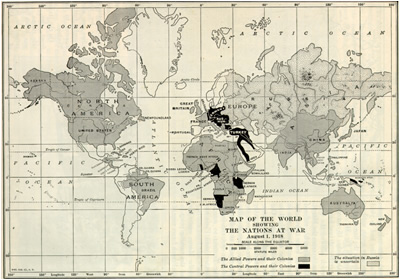| |


 |
|
The first world war, or Great
War, came on almost by accident - in the sense that no one truly intended
it. But the nationalistic boast which the Europeans lived by in their
contest with each other pointed almost inevitably to such a test of wills
and destinies. It had been going on since the late 1800s in the scramble for
colonies in Africa and Asia. Now with that playing field fully exploited, it
was inevitable that the Europeans should test their energies on eachother
within Europe itself.
At the dawn of the century, Europe
(and practically the rest of the world) was ruled by five major powers: the
United Kingdom, France, the German Empire, Russia and the Habsburg Empire.
The Ottomon Empire used to rule the entire Near East. However, the empire
lost most of its territories in the east, and Austria-Hungary took over its
influence on the Balcan.
The first world war started when
the Austrian archduke Franz Ferdinand was assassinated in Sarajevo by
Bosnian nationalists. Servia refused to extradite the archduke's murderer,
and therefore Austria-Hungary declared war on Servia, with Germany's
support. Russia, Servia's closest ally, declared war on Austria-Hungary and
Germany, and Russia where therein supported by France. Britain was involved
in the war when Germany violated Belgium's neutrality to invade France from
the north. The Ottomon Empire, as Germany's ally, supported the central
powers. Italy, though an ally of Germany and Austria, declared war on both
in 1915.

The United States jumped into the
war in late 1917 and provided just enough weight to break a gruesome
three-year stalemate - so that the war mercifully came to an end in 1918.
President Wilson tried to give victory some lofty moral qualities, but few
people bought the idea, either in Europe or in America. All Wilson's fine
rhetoric at the peace conferences could not dismiss the deep cynicism that
had come to replace the westerners' usual optimism.
In 1919, a peace treaty was signed
in the French city of Versailles, known as the Treaty of Versailles, which
was to ensure peace for further generations.
The Habsburg and Ottoman Empires
fell apart after the war, and the German and Russian monarchs were removed
from power. Germany became a republic, and Russia a socialist state after
the Bolsheviks took over control of the country during the Russian
Revolution of 1917.
|
|
|
 |
![]()